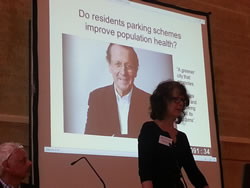Partnership Working

Current Research
SHINE (Supporting Healthy Inclusive Neighbourhood Environments)
Suzanne Audrey is co-lead of the SHINE health integration team (HIT) with Marcus Grant, Associate Professor of Healthy Urban Environments at the University of the West of England (UWE). We are working with partners in housing, transport and planning at Bristol City Council as well as representatives from NHS Bristol and Avon and Wiltshire Mental Health Trust (AWP). Our goal is to use sound science, community voices and innovation to establish Bristol as a healthy city, reduce health inequities, and closely align city development with health, well-being, social inclusion and green city aspirations. SHINE will focus on: compiling an evidence base; encouraging links between key stakeholders; collating and improving the collection of baseline data; developing interventions and appropriate research methods; implementing and evaluating interventions, and; disseminating and promoting good practice.
More information on the SHINE HIT launch.
Completed Research
Health Improvement For Looked After Children
Looked after children are disadvantaged in terms of their overall health. Poor health and social outcomes may be the result of neglect and abuse prior to being taken into care, but may also reflect the limitations of service provision. However, very little is known about the health behaviours and views of looked after children. This short consultation study, led by our colleagues at the Public Health Improvement Research Network at Cardiff University, included interviews with young people and focus groups with nurses, to explore the experiences and perceptions of 16 to 19 year olds as they take more responsibility for their own health. The findings informed a further funding bid focusing on health improvement interventions for looked after children.
Mentoring vulnerable and excluded adolescents to achieve better health and well-being: A feasibility study and pilot RCT of the Breakthrough Mentoring Scheme
Researchers at the University of Bristol undertook a feasibility study and pilot RCT for a full scale trial to evaluate the effectiveness and cost-effectiveness of a mentoring scheme called “Breakthrough mentoring”, in increasing health, well-being and educational outcomes in young people.
The Breakthrough mentoring scheme has been running in South Gloucestershire and adjacent authorities for over 10 years and is an activity-based one-to-one scheme that provides vulnerable and excluded individuals with an adult mentor. Researchers aim to investigate the effectiveness of the scheme by looking at referrals of vulnerable students in secondary schools. The primary outcome measure is the Strengths and Difficulties Questionnaire (SDQ). Secondary outcome measures include the Warwick-Edinburgh Mental Wellbeing Scale (WEMWBS) and a range of measures assessing risk-taking behaviour, social capital and school. The feasibility study entailed a process evaluation and lasted 28 months, from June 2013 to September 2015.
The research study, led by Professor Rona Campbell, and a multidisciplinary team of researchers across the University, was a collaboration between South Gloucestershire Council and the University of Bristol and was funded by the NIHR School for Public Health. Further details are available here on the NIHR SPHR website.
Youth mentoring: factors influencing effectiveness of youth mentoring programmes and assessment of outcomes
Heide Busse's mixed-methods PhD studentship explored the area of youth mentoring in the UK. This involved investigating factors influencing the effectiveness of youth mentoring schemes and the methods that are currently used to assess outcomes of schemes, particularly those which are practical to measure and important to individuals involved in the process.
Mentoring is a one-to-one relationship in which an individual gives time to support, guide and encourage another individual and is used in a variety of settings. Youth mentoring has been suggested as one way to provide a young person with trusting and guiding relationship with an adult with the aim of promoting health and well-being and preventing negative outcomes. There is a lack of research on the effectiveness of mentoring schemes, particularly in the UK, and questions remain on how outcomes of schemes can and should be assessed.
Heide's PhD was funded by the Centre for the Development and Evaluation of Complex Health Interventions for Public Health Improvement (DECIPHer).
Travel to Work cluster randomised controlled trial
The aim of this trial, led by Dr Suzanne Audrey, was to examine the acceptability, effectiveness and cost effectiveness of a workplace based scheme to encourage walking to work.
People who took part were given Walk to Work booklets and pedometers. They were helped to work out safe walking routes and encouraged to set goals for walking to work. Extra encouragement was provided through four contacts from the Walk to Work promoter over the following 10 weeks. This was either in person, by email or by telephone, whichever is better for the workplaces and the employees.
The other workplaces continued as usual so that physical activity and travel mode could be compared between those people in workplaces that received the intervention and those who did not.
The protocol was published in BMC Public Health
